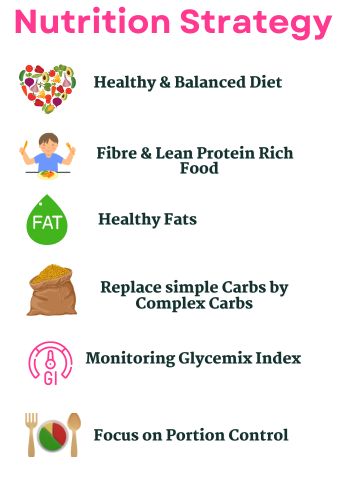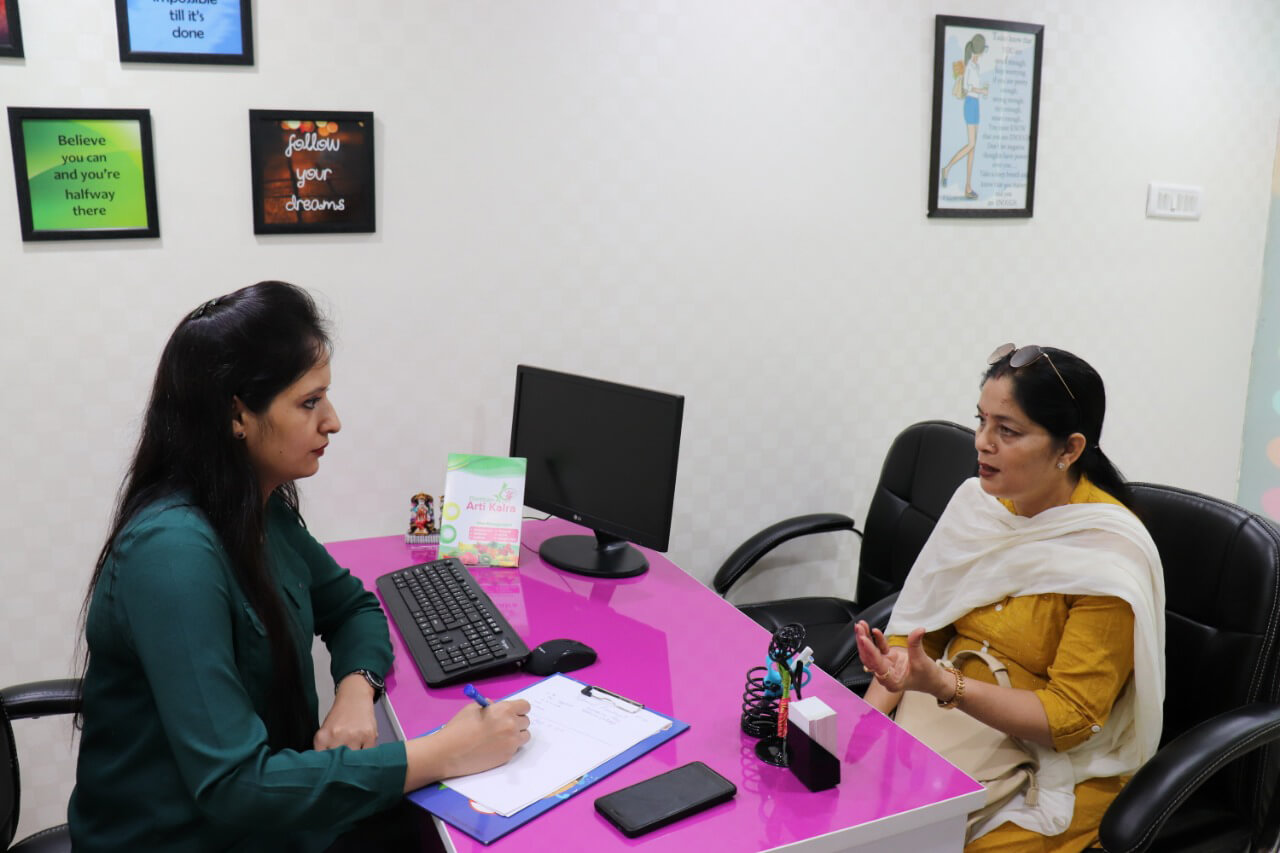
Best Diabetes Dietician in Noida
Helped 11500+ People
14+ Years of Experience
Diabetes Reversal is Possible



What Is Diabetes
Diabetes is a chronic metabolic disorder characterized by elevated levels of glucose (sugar) in the blood. This occurs either because the body doesn't produce enough insulin, a hormone essential for regulating blood sugar levels, or because the cells don't respond effectively to insulin, a condition known as insulin resistance, or a combination of both factors. Insulin is produced by the pancreas and facilitates the uptake of glucose from the bloodstream into cells, where it is used for energy or stored for later use.There are several types of diabetes, with the most common being type 1 and type 2 diabetes. In type 1 diabetes, the immune system attacks and destroys the insulin-producing beta cells in the pancreas, leading to a deficiency of insulin. Type 1 diabetes typically develops in childhood or adolescence and requires lifelong insulin therapy for survival.
In contrast, type 2 diabetes is characterized by insulin resistance, where cells become less responsive to insulin's effects, and impaired insulin secretion from the pancreas. Type 2 diabetes is often associated with obesity, sedentary lifestyle, and genetic predisposition. It usually develops gradually and can remain undiagnosed for years.


Types Of Diabetes
1. Type 1 Diabetes: Type 1 diabetes results from the immune system mistakenly attacking and destroying the insulin-producing beta cells in the pancreas. This autoimmune response leads to an absolute deficiency of insulin, requiring lifelong insulin therapy for survival. Type 1 diabetes often develops in childhood or adolescence, although it can occur at any age. Its exact cause remains unknown, but genetic predisposition and environmental triggers are believed to play a role.2. Type 2 Diabetes: Type 2 diabetes is the most common form of diabetes, accounting for the majority of cases worldwide. It typically develops gradually as a result of insulin resistance—a condition in which cells become less responsive to insulin's effects—and impaired insulin secretion from the pancreas. Type 2 diabetes is closely linked to obesity, sedentary lifestyle, and genetic predisposition. It often occurs in adults but is increasingly diagnosed in children and adolescents due to rising obesity rates.
3. Gestational Diabetes: Gestational diabetes occurs during pregnancy when hormonal changes and insulin resistance lead to elevated blood sugar levels. While it usually resolves after childbirth, women with gestational diabetes are at increased risk of developing type 2 diabetes later in life, as are their children.

Reasons of Diabetes
Diabetes, a chronic condition affecting millions worldwide, stems from a complex interplay of genetic, lifestyle, and environmental factors. Understanding the reasons behind its prevalence is crucial for effective prevention and management strategies.- Genetics: Family history plays a significant role in diabetes risk. Individuals with a family history of diabetes are more likely to develop the condition due to shared genetic predispositions.
- Obesity: Excess body weight, especially visceral fat around organs, increases insulin resistance, a hallmark of type 2 diabetes. Sedentary lifestyles and poor dietary habits contribute to the rising rates of obesity, further exacerbating diabetes risk.
- Unhealthy Diet: Diets high in processed foods, sugars, and unhealthy fats contribute to insulin resistance and obesity. Lack of adequate fiber, essential nutrients, and overconsumption of sugary beverages are particularly detrimental to blood sugar control.
- Physical Inactivity: Modern sedentary lifestyles devoid of regular physical activity impair glucose metabolism and contribute to insulin resistance. Regular exercise not only helps maintain a healthy weight but also improves insulin sensitivity.
- Age and Ethnicity: Aging is associated with a decline in insulin sensitivity, increasing the risk of diabetes. Certain ethnic groups, such as African Americans, Hispanics, Native Americans, and Asian Americans, are predisposed to higher diabetes rates due to genetic and lifestyle factors.
Risks Associated With Diabetes
- Cardiovascular Disease: Individuals with diabetes are at a higher risk of developing cardiovascular diseases such as heart disease, stroke, and peripheral artery disease. Elevated blood sugar levels can damage blood vessels and increase the buildup of fatty deposits, leading to atherosclerosis and increased risk of heart attacks and strokes.
- Kidney Damage (Nephropathy): Diabetes is a leading cause of kidney disease. High blood sugar levels can damage the kidneys' filtering units over time, leading to kidney dysfunction and eventual failure if left untreated.
- Nerve Damage (Neuropathy): Diabetes can cause nerve damage, leading to symptoms such as numbness, tingling, and pain, particularly in the hands and feet. This condition, known as diabetic neuropathy, can also affect digestion, sexual function, and lead to foot ulcers and infections.
- Eye Complications (Retinopathy): Diabetes can damage the blood vessels in the retina, leading to diabetic retinopathy, a leading cause of blindness in adults. It can also increase the risk of other eye conditions such as cataracts and glaucoma.
- Foot Complications: Diabetes can cause poor circulation and nerve damage in the feet, increasing the risk of foot ulcers, infections, and ultimately, amputation if not properly treated and managed.
- Skin Conditions: Diabetes can lead to various skin problems, including bacterial and fungal infections, itching, and slow wound healing.

Clinic Gallery
Featured Video
FAQ's about Diabetes Reversal Program
A diabetes reversal program is a structured plan designed to help individuals with diabetes achieve better blood sugar control and potentially reverse the progression of the condition through lifestyle modifications such as diet, exercise, and weight management.
A diabetes reversal program typically includes dietary changes, regular physical activity, weight management strategies, stress reduction techniques, and sometimes medication adjustments under medical supervision.
The time it takes to reverse diabetes varies from person to person and depends on factors such as the severity of the condition, adherence to the program, and individual response to lifestyle changes. Some people may see improvements in weeks to months, while others may take longer.
A diabetes reversal diet typically focuses on whole, unprocessed foods such as fruits, vegetables, whole grains, lean proteins, and healthy fats. It often involves limiting refined sugars, processed foods, and high-glycemic carbohydrates.
Exercise helps improve insulin sensitivity, lower blood sugar levels, and promote weight loss, all of which are beneficial for managing and potentially reversing diabetes.
Depending on individual circumstances and medical advice, some people may be able to reduce or even eliminate their diabetes medications as their blood sugar levels improve through lifestyle changes. However, this should always be done under medical supervision.
How Dietician Arti Kalra Can Help you to Reverse Diabetes
In the battle against diabetes, one of the most powerful weapons in the arsenal is proper nutrition. Enter Dietitian Arti, a vital ally for individuals seeking to manage and reduce their diabetes through dietary interventions. With their expertise in nutrition science and personalized counseling, dietitians like Arti play a pivotal role in empowering individuals to make informed food choices, optimize their eating habits, and achieve better blood sugar control.
One of the primary ways Dietitian Arti helps reduce diabetes is by crafting personalized meal plans tailored to individual needs, preferences, and health goals. Through comprehensive assessments of dietary habits, medical history, and lifestyle factors, Arti can design meal plans that prioritize nutrient-dense foods, control portion sizes, and regulate carbohydrate intake—key strategies for managing blood sugar levels effectively.
Furthermore, Dietitian Arti educates individuals about the glycemic index (GI) and glycemic load (GL) of foods, essential tools for understanding how different carbohydrates impact blood sugar levels. By emphasizing the consumption of low-GI foods that cause gradual, steady increases in blood sugar, Arti helps stabilize glucose levels and prevent spikes and crashes—a crucial aspect of diabetes management.
In addition to meal planning and carbohydrate management, Dietitian Arti guides individuals in making healthier food choices and substitutions. They provide practical tips for navigating grocery stores, reading food labels, and preparing balanced meals at home. By promoting the inclusion of fruits, vegetables, whole grains, lean proteins, and healthy fats while limiting processed foods, sugary snacks, and high-fat items, Arti empowers individuals to adopt sustainable dietary habits conducive to diabetes management and overall health.
Moreover, Dietitian Arti collaborates with individuals to address other dietary considerations often associated with diabetes, such as weight management, and blood pressure regulation. By promoting weight loss through calorie control and lifestyle modifications, recommending heart-healthy dietary patterns like the Mediterranean diet, and encouraging regular physical activity, Arti helps mitigate the risk factors contributing to diabetes complications and comorbidities.
In conclusion, Dietitian Arti serves as a beacon of knowledge, support, and guidance for individuals navigating the complex landscape of diabetes management. Through personalized nutrition counseling, meal planning, education, and empowerment, Arti equips individuals with the tools and strategies they need to take control of their health, optimize their dietary choices, and reduce the impact of diabetes on their lives. With Dietitian Arti by their side, individuals with diabetes can embark on a journey toward improved well-being, greater resilience, and a brighter future free from the shackles of uncontrolled blood sugar.
Call Now : 8595805076





